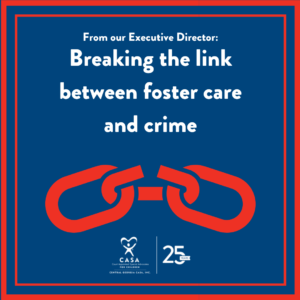July 2022

On June 14, 2022, Central Georgia CASA was honored to be named one of the initial recipients of the Macon Violence Prevention grant. This grant is one aspect of the Macon Violence Prevention Strategic Plan and was designed to support local charitable organizations in their efforts reduce violent crime in Macon-Bibb County. Of course, the obvious question is:
What does advocating for children in foster care have to do with preventing crime?
The linkage between foster care and crime, particularly for teens, is both clear and disturbing. According to the Juvenile Law Center, youth experiencing foster care are more likely than their non-foster care peers to commit crimes as juveniles. In fact, by the age of 17, over half of youth experiencing foster care will have also experienced an arrest, conviction, or overnight stay in a correctional facility. Furthermore, 25% of youth will be involved in the criminal justice center within 2 years of leaving foster care. These statistics are even more startling when youth experience placement instability while in foster care. When youth are placed in group homes, they are 2.5 times more likely than their peers to have criminal justice system involvement. Additionally, 90% of youth who experience more than 5 placement changes in foster care enter the criminal justice system. Finally, as much as 80% of the nation’s prison population consists of former foster youth. This link between foster care and criminal justice system involvement is so strong that some have used the term “foster care to prison pipeline” to describe the issue.
While these statistics are dire, we know that CASA Volunteers can make a tremendous difference in breaking these statistics and changing children’s stories one child or youth at a time. In fact, data indicate children and youth experiencing foster care who have the benefit of a CASA Volunteer advocating for their best interest beat these odds in several categories. Children and youth with a CASA Volunteer experience significantly fewer placement changes while in foster care, which reduces their risk of criminal justice system involvement and stabilizes their educational experience since each placement change is generally associated with a school change. Additionally, a 2009 study indicated, having a CASA Volunteer means that the child is more likely to be passing all classes and have fewer conduct infractions and fewer expulsions in school.
In addition to being a stabilizing influence in a child’s life during foster care, numerous studies of juvenile courts around the country have found that when a CASA Volunteer is assigned, a higher number of services are ordered for children and families. In fact, in a 2020 survey of juvenile court services across the nation, 83% of juvenile court judge reported that one of the most important impacts of CASA Volunteers is ensuring that appropriate services are offered to the child and family.
Central Georgia CASA’s receipt of the Macon Violence Prevention grant is, at its heart, about preventing crime before it starts by providing the most vulnerable children and youth in our community with high quality best interest advocacy. If we can disrupt the so-called Foster Care to Prison Pipeline by advocating for the best interest of children in foster care, we can make a tremendous difference in the lives of individual youth, in the lives of their families, and in the life of our community as a whole.
